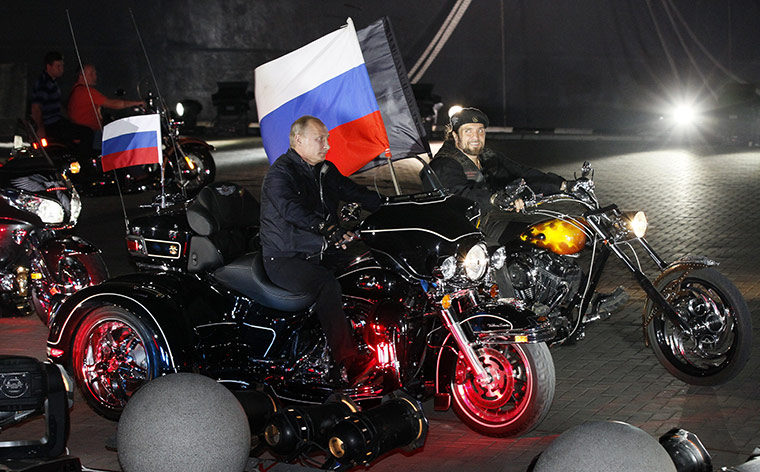Free Enterprise Capitalism
"It's a dangerous game to align yourself with Putin when you're based in the U.S. or U.K. It could be damaging to your firm, and your U.S. or European clients may feel uncomfortable."
Daniel Moss, professor of public affairs, University of Chester, Britain
"I wouldn't give Ketchum [New York-based public relations firm] an A+ for ethics. I assume most U.S. citizens wouldn't be too happy [with its work for both governments; U.S. and Russia].
Guy Golan, associate professor of public relations, Syracuse University Newhouse School of Public Communications
 |
A black-clad
Vladimir Putin rides into a biker festival with Alexander Zaldostanov,
leader of the Night Wolves biker gang, in the Black Sea port of
Novorossiysk
Photograph: Ivan Sekretarev/AFP/Getty Images
|
Some of Russian President Vladimir Putin's very good personal friends of long standing who are also Russian tycoons (Oligarchs in the vernacular) have been sanctioned by the United States and other Western countries in retaliation for the Kremlin conspiring to emasculate and eviscerate Russia's neighbour and former Soviet satellite, Ukraine. In a swift-moving conspiracy geared to promote civil agitation, Russian agents have successfully led the Crimean Peninsula into Moscow's hands.
As though Russia hasn't more than enough massive gas reserves in its economic arsenal to keep it thriving, now it also has those which were formerly in the possession of Ukraine. Surely more than enough to balance off the added expenses of bailing Crimea out of his financial doldrums. Even under the duress caused by sanctions which have indeed begun to impact an already-enfeebled Russian economy thanks in part to a massive $65-billion outlay for entertaining the world of international sport at Sochi.
While the United States appears to have come awake from its drowsy state of disowning responsibility as the world's sole remaining super power, acceding to Vladimir Putin's good word on Syria and Iran, that in the case of both internal conflict and weapons deception, diplomatic overtures and the niceties of public opinion would turn both countries into meek little household felines from their exhibited sense of being ferocious man-eating tigers, in countering Russian domination of Ukraine, it hasn't completely absorbed its own propaganda.
The message hasn't got through to American public relations companies who enjoy earning their multiple-millions from Russian government sources through their sterling capacity in burnishing the raw and tarnished image of an autocratic government whose president has presented himself as a modern-day celebrity-hero writ large. The ThinkRussia.com site operated by Ketchum since 2006 has been of huge use to Vladimir Putin, shunting aside for his admirers such trifles as sabre-rattling and rattling Ukraine out of its territory.
Advertisement giant Omnicom Group earned over ten million from the Russian government and OAO Gazprom, the natural gas exporters, state-controlled, according to American government data for 2013. And it's not only the United States giving whole-hearted boosts to Putin and Russia, but a London company owned by Omnicom representing Gazprom. And Brussels-based G+ Europe, also an Omnicom agency advises Moscow at G8 summits, shaping its media strategy. Forget G8 now.
"Communicating in challenging times is even more crucial for our clients, and we are helping them do just that", stated Hudson Sandler chief executive Andrew Hayes unabashedly, working for Gazprom's oil arm and the Russian Direct Investment Fund. Dmitry Peskov, speaking for Mr. Putin, said the government of Russia is "very satisfied with Ketchum, and their services." Doubtless. But at a time when Russia is under EU, U.S., Canada sanctions, doesn't it seem ridiculous that British- and U.S.-based PR firms are aiding Russia to weather those sanctions?
Thousands of Russian troops are deployed near the border with Ukraine. The rest of eastern Ukraine is being challenged by Russian thugs. Billions poured into the Sochi Olympics. Putin is preparing to welcome a gathering of global business and political elite at the St.Petersburg International Economic Forum, with the U.S. administration pressuring CEOs to bypass, but American public relations are working overtime on hefty commissions to laud the main protagonist in the destruction of Ukraine?
Such work, said Paul Simpson, professor of communications at University of Greenwich, London should be "as much about being a conscience for an account as it is a megaphone. It can't be based on being blind to the unethical reality of the situation on the ground." But the simple fact is, regrettably, that the free enterprise capitalist system doesn't rely on ethical underpinnings, but on the bottom line. Which explains why Saddam Hussein, Muammar Qaddafi and Sweden and Denmark too, have always hired outside public relations experts to make them look good.
"We've turned down two people who are on the sanctions list", said a CEO of Bell Pottinger, London. How's that for sanctimony for a company that has worked with such notables as Belarus President Aleksandr Lukashenko?
Labels: Celebrity, Controversy, Public Relations, Russia, Sanctions, United States, Vladimir Putin

<< Home